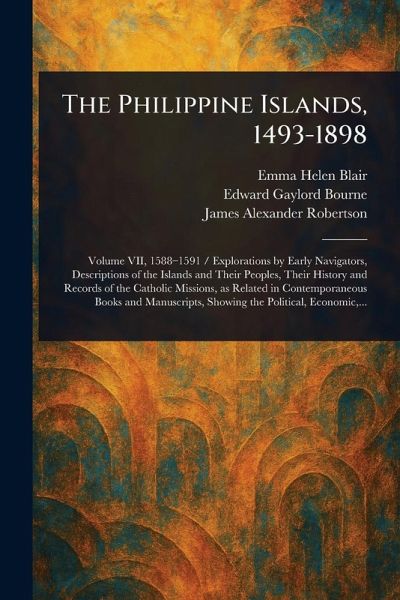
The Philippine Islands, 1493-1898
Versandkostenfrei!
Versandfertig in über 4 Wochen
18,99 €
inkl. MwSt.

PAYBACK Punkte
9 °P sammeln!
Explore the tumultuous early history of the Philippines with "The Philippine Islands, 1493-1898," a comprehensive historical record. This volume (Volume 7, 1588-1591) delves into the period following the demarcation line of Alexander VI, charting the islands' course as a Spanish colony during the 16th century. Compiled from various sources, this meticulously prepared account offers invaluable insights into the exploration and development of the Philippines. It sheds light on the complex interplay of cultures and powers that shaped the region during this pivotal era. Perfect for anyone interest...
Explore the tumultuous early history of the Philippines with "The Philippine Islands, 1493-1898," a comprehensive historical record. This volume (Volume 7, 1588-1591) delves into the period following the demarcation line of Alexander VI, charting the islands' course as a Spanish colony during the 16th century. Compiled from various sources, this meticulously prepared account offers invaluable insights into the exploration and development of the Philippines. It sheds light on the complex interplay of cultures and powers that shaped the region during this pivotal era. Perfect for anyone interested in Southeast Asian history, Latin American connections to global events, or the broader scope of world history, this book provides a vital understanding of a fascinating and often overlooked chapter in global exploration and colonization. Discover the enduring story of the Philippines in its formative years. This work has been selected by scholars as being culturally important, and is part of the knowledge base of civilization as we know it. This work is in the public domain in the United States of America, and possibly other nations. Within the United States, you may freely copy and distribute this work, as no entity (individual or corporate) has a copyright on the body of the work. Scholars believe, and we concur, that this work is important enough to be preserved, reproduced, and made generally available to the public. We appreciate your support of the preservation process, and thank you for being an important part of keeping this knowledge alive and relevant.














